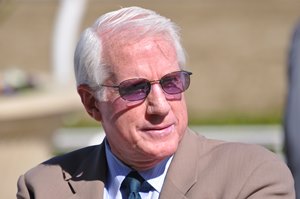CA Task Force Seeks Sudden Death Research Support


Speaking before the California Horse Racing Board Jan. 20, California Thoroughbred Trainers executive director Alan Balch presented areas of focus by a California accident prevention task force he heads, including research into equine sudden deaths.
Balch began his presentation by seeking to dispel arguments that 2-year-old racing is damaging to young horses, citing research from orthopedic surgeon Dr. Larry Bramlage in which he noted that equine injury data shows that horses who raced as juveniles are at a decreased risk of career-ending injury compared to those who did not.
During the second half of his remarks during the CHRB's monthly videoconferenced meeting, Balch emphasized the need for further evaluation of equine fatalities related to sudden death and shoulder injuries. A cause cannot be attributed to approximately 20-25% of sudden-death incidents, he said, necessitating more study.
"Therefore, we will propose to the (Grayson-Jockey Club Research Foundation) that it make an enormous incremental financial commitment beyond its already generous support of all veterinary research, specifically to determine further the causes of these fatalities," Balch said. "And we will suggest that both medical and epidemiological research be joined in the new effort."
The foundation is the nation's leading source of equine research funding, supporting the health and safety of horses. It underwrites research projects in North America and overseas.
An analysis of genetic markers in equines that could point to predisposition of sudden cardiac failure should further be pursued, Balch said, mentioning that Dr. Dionne Benson, chief veterinary officer for The Stronach Group, has informed him that TSG has already been studying that for the past two years.
Related to efforts made to reduce shoulder injuries, Balch said a continuing education module offered by the CHRB in the state has been successful, and "we need to consider ways of making this continual review compulsory for owners, trainers, and veterinarians." He also recommended a guide of best practices.
He concluded that the Thoroughbred Owners of California has been assigned Joe Hasson to work with the task force to evaluate their analytical data.
Also during Thursday's meeting, the CHRB granted TSG an extension for the installation of a sprinkler system at San Luis Rey Training Center in Southern California. Officials had hoped to wrap up the long-delayed project by the end of this month, but TSG said COVID-19-related issues pushed back completion until the end of February.
The facility was ravaged by a brush fire in late 2017 in which 46 horses died.
The CHRB concluded its meeting with support expressed toward its equine medical director Dr. Jeff Blea, who is on administrative leave pending a formal hearing that begins Jan. 21 before the California Veterinary Medical Board. His license was temporarily suspended following an emergency hearing by the VMD after an anonymous complaint.
Among other accusations, he and other veterinarians are alleged to have prescribed and administered medications to horses without an examination or medical necessity during a time when he was an equine veterinarian in private practice on Southern California backstretches. He took his position with the CHRB last summer.
Three CHRB commissioners and executive director Scott Chaney repeated earlier CHRB statements in which they praised Blea's integrity. CHRB chairman Dr. Greg Ferraro speculated that the VMD action is politically motivated.
"The CHRB is doing everything in its legal power to right this wrong," Chaney said during his report, which preceded a closed session of the board in which legal matters are privately discussed.
